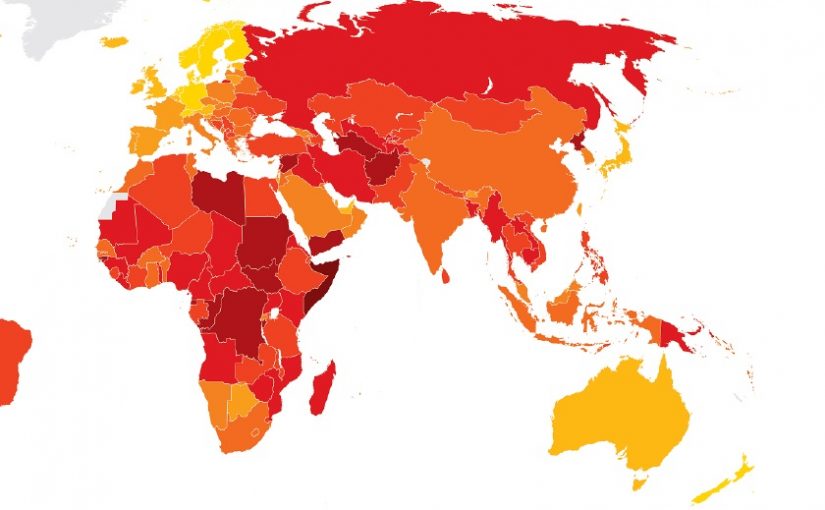Mozambique and Angola deepen economic and cultural cooperation
Mozambique, most Portuguese-speaking countries improve in Corruption Perceptions Index

Map: Transparency Internacional / CPI 2019
Most of the nine Portuguese-speaking countries have improved or maintained their rating in the Corruption Perception Index (CPI) released by Transparency International (TI) on Tuesday, which sees only Brazil and Equatorial Guinea fall in the rankings.
Angola went from 19 to 26 points, earning the biggest increase in number of places (19) among Portuguese-speaking partners. After having climbed from 167th to 165th in 2018, the country now occupies 146th place on the list, the same as that of Mozambique.
In 2018, Mozambique had lost two points, going from 25 to 23, and dropped five positions, from 153rd to 158th. In this year’s index, which refers to 2019, Mozambique recovered its score, now has 26 points, rising 12 positions and it is on position 146.
In the same way, Timor-Leste won 38 points, recovering the three lost in 2018, and rose to 93rd from 105th position.
Guinea-Bissau also countered the trend of last year, gaining 18 points and moving up four places to 168. In 2018, Guinea-Bissau had lost one point (16 points) and had fallen from position 171st to 172nd.
Cape Verde obtained 58 points in this assessment, rising to 41st place (45th in the previous year) and consolidating its position as the third best-ranked country in Sub-Saharan Africa, after the Seychelles (66 points) and Botswana ( 61 points).
São Tomé and Príncipe maintained the 46 points and the 64th position that it had in the previous edition of the Index, and occupies the seventh position among the countries of Sub-Saharan Africa.
Cape Verde and São Tomé and Príncipe continue to record scores above the average for Sub-Saharan African countries (32 points), which is the region with the worst performance in the CPI, and the global average of 180 countries (43 points).
Portugal lost two points, falling from 64 to 62, but remained in position 30, which, according to the Portuguese chapter of Transparency International, represents a stagnation of the country in the index seven years ago.
In the 2018 CPI, Brazil lost two points and dropped nine positions, its worst performance since 2012. In his year’s edition, the country has maintained its 35 points, but slid one more place from 105th to 106th in the 180 countries and territories assessed.
The document points out that corruption remains one of the main impediments to the country’s social and economic development.
“After the 2018 elections, strongly influenced by an anti-corruption agenda, Brazil experienced a set of setbacks in anti-corruption legislation and had difficulties in advancing reforms in the political system,” it points out.
Equatorial Guinea maintained the 16 points it scored in the previous index, but lost one place and fell to 173rd among the 180 countries on the list.
Transparency International’s Corruption Perception Index was created in 1995, and is one of the world’s leading indicators of perceived corruption in the public sector of the 180 countries assessed, scoring them from 0 (perceived as very corrupt) to 100 ( perceived as very transparent).
Denmark and New Zealand share top place in the 2019 table with 87 points, followed by Finland with 86 and Singapore, Sweden and Switzerland with 85.
This year’s ranking relates the impact of corruption to political integrity and the results show that the best-ranked countries are those which have proactive transparency policies regarding political financing, lobby regulation and conflicts of interest, and efficient public consultation mechanisms.
Countries where political campaign funding regulations are comprehensive and systematically enforced have an average score of 70 on the index, while countries where such regulations do not exist or are poorly enforced have an average of just 34 and 35, respectively.
By region, Western Europe and the European Union attain the highest average, with 66 points, and Sub-Saharan Africa, with 32 points, comes lowest, below Eastern Europe and Central Asia with 35 points, on average.
Read the full ‘Corruption Perceptions Index 2019’ HERE












Leave a Reply
Be the First to Comment!
You must be logged in to post a comment.
You must be logged in to post a comment.